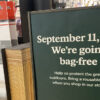Since the S&P 500 hit its high for 2011 on April 29 to August 10, 2011, $3.3 trillion invested in the U.S. stock market has been wiped out. The value of American stocks owned fell from $16.82 trillion to $13.57 trillion—19.3 percent. See Chart. That is more than the Gross Domestic Product–the value of all of the goods and services produced in a country—in 2010 of Canada ($1.3 trillion), the U.K. ($2.2 trillion), or Germany (3.1 trillion).
While we may not know precisely for some time what triggered this decline in value from the April 29th high, rapidly growing government debt of the last few years certainly played a central role. European economies share this fault with the U.S. Their stock markets lurch downward daily like ours with each new debt crisis in Greece, Italy, or some other European Union member country. Like us, they spent beyond their means and are now in terrible financial shape. A country can only spend more than it takes in for so long. That is why the ratings agencies put the U.S. government on warning April 18, 2011, days before the market began to fall. Many saw the day of reckoning on its way.
When Standard and Poors downgraded the credit rating of the United States government’s sovereign debt on August 5 after the stock exchanges closed, the markets capitulated the following Monday as the reality of our fiscal foolishness finally struck home for all investors. They needed a ratings agency to spell it out for them and take action. If the government wasn’t overburdened with debt and deficit spending, and wasn’t constantly meddling in areas it does not belong, the stock market would be flying right now. The list of bad government policies that harm businesses–such as the 35 percent U.S. corporate tax rate, expensive to follow Sarbanes-Oxley laws, and the power hungry Environmental Protection Agency’s unneeded regulations–is long. Imagine what the markets would do if they weren’t overburdened by the threat of government short circuiting and coming to the American taxpayer and American businesses for a bailout, and if companies could invest in their futures without so much interference from the nanny state.
It is time for the government to face the music. Hearing “Markets will rise and fall, but this is the United States of America,” as President Obama mentioned as the Dow Jones Industrial Average tanked 634 points August 7th, is of no condolence to the millions of Americans who’s investment accounts have shriveled to the tune of 19.3 percent.
























